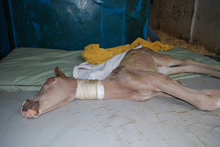The Animal Health Diagnostic Center at Cornell University is now offering a genetic test for Lavender Foal Syndrome (LFS). Lavendar Foal Syndrome is a fatal disease of newborn Arabian foals, particularly those of Egyptian Arabian breeding.

Foal exhibiting neurological symptoms of LFS
A test for Lavendar Foal Syndrome in Arabian horses is available from Cornell University.
© 2013 by Dr. Yael Giora
Signs shown by affected foals include seizures, (involuntary movement of the eyeballs, limb rigidity, paddling movements, and hyperextension of the head, neck, and spine.
The condition gets its name from the abnormal coat color with which most affected foals are born, variably described as silver sheen, lavender, pale chestnut or pale, dull pinkish grey.
Scientists at Cornell University and the Maxwell H Gluck Equine Research Center have found that Lavender Foal Syndrome is the result of a mutation in a gene called myosin Va (MYO5A). All affected foals tested in the study were homozygous for this mutation (i.e. both copies of the gene were defective).
Lead researcher was Samantha A. Brooks, PhD, assistant professor in the Department of Animal Science at Cornell University's College of Agriculture and Life Sciences. “Our results suggest that the population frequency of carriers of this deletion is 10.3% in the Egyptian Arabian,” she reports.
“From a practical standpoint, this discovery and the development of a diagnostic test for the LFS allele provides a valuable new tool for breeders seeking to avoid the disease in their foal crop.”
Testing of breeding animals is recommended to identify carrier horses. The breeding program can then be arranged to avoid mating two carriers, and so prevent the birth of an affected foal.
The test can be run on hair roots pulled from the mane or tail, or whole blood samples.
Normally, the AHDC only accepts samples from accredited veterinarians. However, for this test, Arabian owners are encouraged to submit their own pre-paid samples directly to the laboratory.
The Lavender Foal Syndrome test is not restricted to horses within the USA. Shipment of EDTA whole blood samples from abroad requires a USDA permit. However, according to the laboratory no permit is required for sending hair samples.
(Permits may not be available for the import of blood specimens from some countries. Please contact the laboratory (Lisa Bowen-Laue; 607-253-3938) for the appropriate permit if you wish to submit EDTA whole blood for LFS testing from outside the USA.)
A completely filled out LFS assay submission form must accompany each sample. The cost of the test is $45.00 in addition to a $2.00 accession fee that will be charged for each horse tested. Payment must accompany samples unless samples are submitted by a licensed veterinarian. Payment may be made by VISA, Master Card, Discover, or American Express. Checks or wire transfers cannot be accepted. Please submit credit card information using our credit authorization form. Samples submitted by a veterinarian with an established AHDC billing account will be billed at the end of the month in which the results are finalizedEach sample must be sent with a completed LFS assay submission form. Payment must accompany the samples unless they are submitted by a licensed veterinarian.
For Information on the test, including full instructions on how to submit samples.
